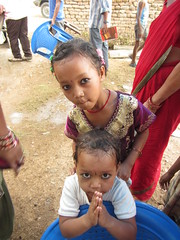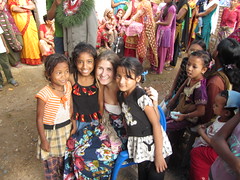06/14/12
I’ve made friends. It seems that every child in Tulsipur has discovered that two Americans live in town, for Alex and I seem to have a little fan club wherever we go. It’s adorable, to say the least, and very endearing. I like to sit at Laxmi Café, about a block from my housing complex and write in my journal while snacking on delicious Nepali foods and drinking milk tea, which is so good that I drink it more than coffee (and I can’t live without coffee). The café is in the center of my neighborhood and provides me with an excellent opportunity to meet the neighbors and see what’s going on.
The women walk by in their brightly colored saris and kurta suruvals (long tunic dresses with loose fitting pants). The men casually stroll by, but do a double take when they see me before proceeding on with their business. The countless Nepalese kids, though, are another matter. Foreigners don’t often visit Tulsipur, especially tall Caucasian foreigners. And so they follow us wherever we go, greet us every morning as we leave for work, and wait for us to get home. Every time I go to the café, the little neighbor kids run over, shouting “Hi! How are you? What is your name?” It doesn’t matter how many times I give them the same answer; they always repeat the same questions, since it’s the only English they know.
The children are adorable and tiny, and the older ones (by older, I mean 8 or 9 years old as opposed to 4) tote babies around on their hips. They always greet me by pressing their palms together in a palm position and squeaking “Namaste!” in their tiny little voices. Some of the children can speak English quite well and I try to carry on basic conversations with them. The English teacher part of me is alive and well.
Most of the children in my neighborhood go to school. I see them walking to school when I head to work each day, wearing state-required uniforms and little children’s ties and shouldering tiny little cartoon-themed backpacks. They wave and shake my hand as they pass, giggling as they ask me my name and where I’m from. I swear I’ve shaken the hand of every single child in Tulsipur by now.
Yet there are also children in my neighborhood who don’t go to school. Some of them are obviously too young for school, but there are a good number of school-age children who don’t attend. Many work – I see them scrubbing floors or pounding out metal in workshops or hauling buckets twice their size down the dusty streets of Tulsipur. It’s hard to tell if they’re child laborers in a culture where so many children are expected to help with chores. It would be foolish and judgmental to make assumptions, yet I find myself wondering if the children I talk to every day are forced laborers. I feel like I become more and more aware of my surroundings with each passing day. There are many large houses in Dang District that also make me question who cleans and cooks in those places. If neighbors in tiny two-room homes have domestic servants, how many more children work in homes double or triple the size of my American home?
As I watch the children play on the streets, I find it difficult to accept that children like these are working in factories, rice fields, mechanic shops, people’s homes, brothels. During the summers of my college years, I used to take care of American children while their parents worked all day. I’m trying to picture my little 6-year-old neighbor Ava or her adorable curly-haired sister Sophia scrubbing floors, or working in brick factories instead of playing with dolls or catching butterflies. The very thought makes me sick to my stomach. Just thinking about my little American neighbors being forced to work motivates me to support every effort to end child labor here.
I’ve learned from experience that one of the best ways to answer the many questions about issues like child labor swarming through my head is to get to know the people in my community. So I’ll be patient and get to know my community without jumping to conclusions about people or children here. I want to learn about everything – the neighbors, the children, the school systems, community programs….everything. It will give me a better perspective on the issue and help me understand why children in my neighborhood are working instead of going to school.
Posted By Rachel Palmer
Posted Jun 27th, 2012





